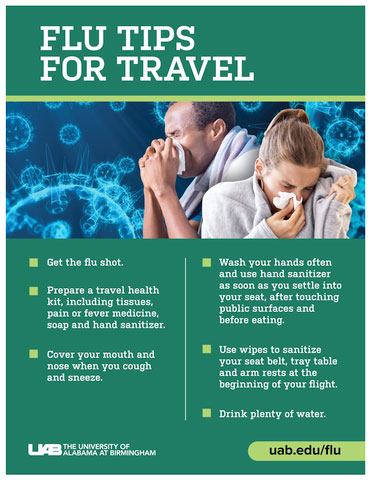If you are traveling during the holidays, expect crowded airports through the new year. An estimated 45.7 million people will fly on United States airlines between Dec. 20 and Jan. 6, according to the Airlines for America trade group.
The busiest days of the 18-day holiday window will be Thursday, Dec. 20, and Friday, Dec. 21. Aside from being prepared for long security lines, it is also important to protect yourself from the flu and other viral illnesses. Experts from the University of Alabama at Birmingham have prepared a list of tips to help you stay healthy and safe during the holiday travel season.
 Click to enlarge.Get the flu shot
Click to enlarge.Get the flu shot
“The flu shot is the best way to protect yourself from the flu,” said Tedra Smith, DNP, CRNP, nurse practitioner and an instructor at the UAB School of Nursing. “It is also the best way to prevent the spread of the flu.”
The Centers for Disease Control and Prevention recommends people age 6 months and older receive an annual flu vaccination. While you may still contract the flu with the shot, the vaccine helps reduce the severity of illness in people who are vaccinated.
Visit www.uab.edu/flu and use the CDC’s Flu Vaccine Finder to locate a place near you to get your shot before you begin your holiday travels.
Prepare a travel health kit
Just as you would arrive to the airport with your tickets and identification, make sure you are prepared for the germs you may encounter along the way to your destination.
UAB recommends preparing a travel health kit for you and your family to have handy, including tissues, pain or fever medicine, soap, hand sanitizer, and sanitizing wipes.
Cover your mouth and nose when you cough and sneeze
With the increased number of travelers, expect the airport, planes and other places of public transportation to be crowded. This means more people will be in close contact and there is a greater risk for the spread of germs. To help protect those around you, cover your mouth and nose when you cough and sneeze.
“When you cover your mouth or nose when you cough or sneeze, the germs will then spread onto everything else you touch with your hands,” Smith said. “Instead, use your elbow or a tissue. This will greatly reduce the number of germs that spread to people and objects around you.”
Wash your hands and use hand sanitizer
Do not leave the house without hand sanitizer or wipes. Even if you took precautions to protect yourself from the flu, that does not mean everyone around you also did the same.
It is recommended that you use hand sanitizer or wash your hands with soap after touching your face or public shared spaces such as door handles, seat buckles and transportation seats.
To find out the proper way to wash your hands, watch this video.
Do not forget sanitizing wipes
Some of the germiest places on airplanes are right where you sit. Use disinfecting wipes to clean armrests, tray tables and seatbelts when you board your flight. You can even use wipes to clean handrails you may touch, or when opening and closing door handles.
If you are staying in a hotel, the wipes are also useful to disinfect the television remote control, the toilet handle, elevator buttons and other frequently touched surfaces.
Drink plenty of water
Stay hydrated to help your body fight viruses. Water helps keep your temperature normal, protects your spinal cord and other sensitive tissues, and gets rid of wastes through urination, perspiration and bowel movements.
According to the CDC, your body also needs more water when you are running a fever. To stay hydrated, stick with water and avoid caffeinated beverages.
To find out more about how to protect yourself from the flu, visit the UAB flu website.
